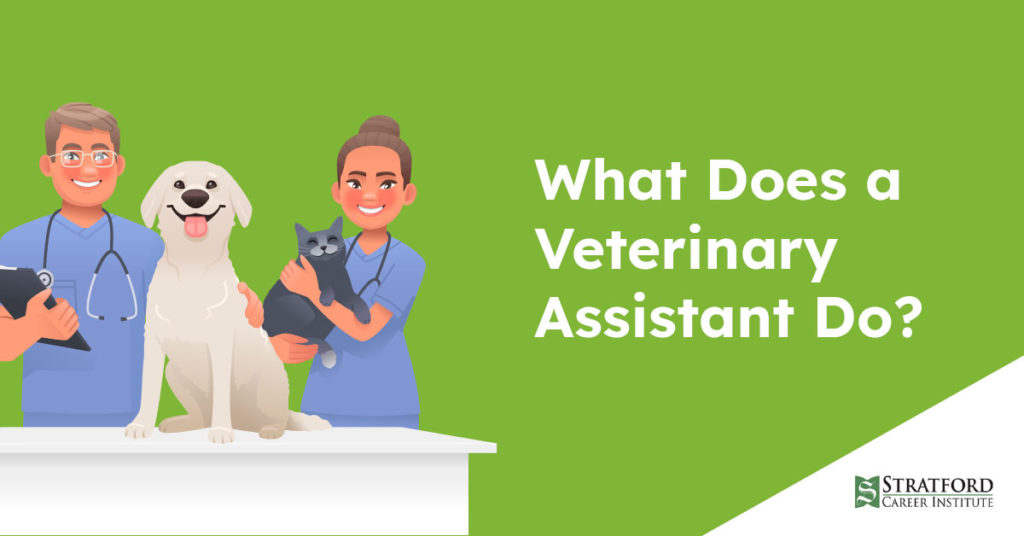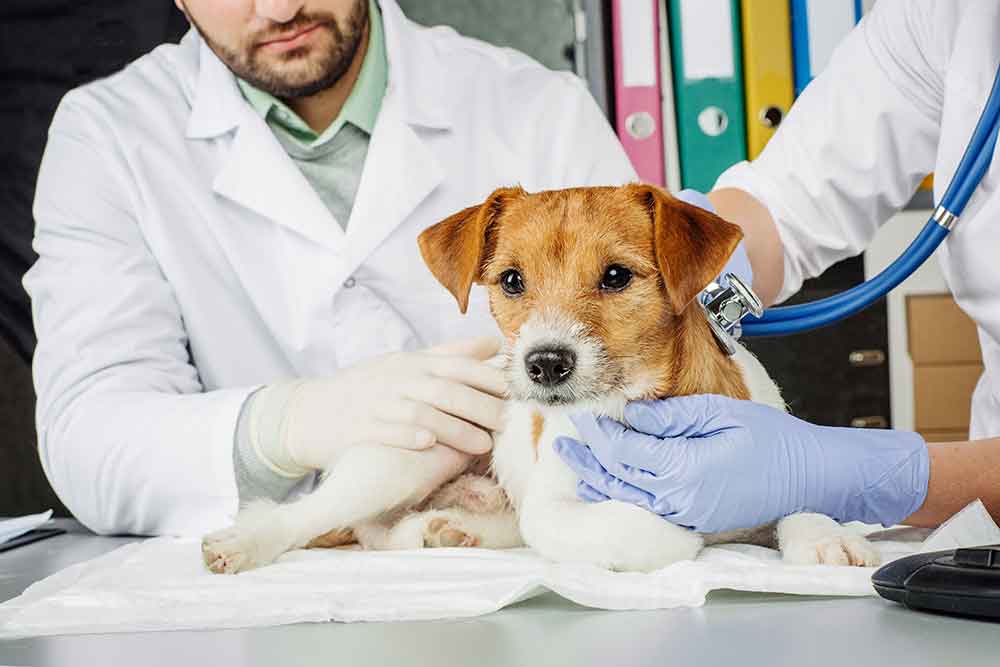Watch The Video For Our Vet Assistant Online Course!
Everyone knows what a veterinarian does: they take care of animals.
Some specialize in taking care of domesticated animals. Others specialize in taking care of exotic animals or competition animals.
Additionally, a veterinarian is tasked with knowing how to medically care for a wide variety of animals.
So what does a veterinary assistant do? A veterinary assistant is there to help the veterinarian with treatment.
They work under the direction of either the veterinarian or the veterinary technician. As a result, they are there to do a variety of tasks that make it easier for their superiors, veterinarian, and veterinary technician.
Here are a few tasks that a veterinary assistant may commonly perform, as well as some of the responsibilities typically listed in a veterinary assistant job description.

Maintaining Pet Records
Vet assistants have the unique opportunity to perform both medical and clerical work. On the clerical side, vet assistants have quite a few responsibilities.
This includes updating and maintaining records for pets, billing pet owners, and setting up appointments.
Since vet assistants frequently deal with pet owners, they need great customer service and communication skills in addition to basic veterinary knowledge.
Cleaning Vet Facilities
While vet assistants perform limited medical treatment, they play an important role when it comes to sterilization of equipment.
So, what do vet assistants do when they’re not interacting with pet owners? In short, they often help set up surgical areas under the supervision of a vet or vet technician.
They’re also responsible for keeping all kennel areas clean for the animals. This includes disinfecting cages, examination rooms, and more.
Keeping Animals Secure

When animals come to the vet’s office, they may not react well.
Some animals do not want to sit still, some will react defensively, some just won’t cooperate at all.
A veterinary assistant will spend a lot of their time, especially early on in their career, holding animals while they’re given shots, while blood is being drawn, and while they’re being fed medication.
Out of all veterinary assistant duties, this one is where great animal handling skills come into play the most.
Weighing Animals
Almost any trip to the vet starts with finding out if your animal is gaining or losing weight, and figuring out if they’re on target for their species and breed as far as their weight.
If you’ve spent any time in your local vet’s office, you may have seen that it’s a struggle to get dogs, cats, and other animals to stay still on the weight long enough to be able to get an accurate measurement.
This is where a vet assistant comes in, to make sure that the weight is right and accurate.
Washing Animals
Some animals that come to a vet’s office need a wash before a procedure.
If the animal is going to be undergoing some sort of surgery, it may be in need of a wash before they can perform the surgery (as well as shave the fur from the area where the surgery will take place).
In some veterinary offices, it is standard to wash a pet if they’re going to be there for any length of time, and that is often the work of a veterinary assistant.
Drawing Blood And Collecting Samples
Because a pet cannot tell you what is wrong with them, a diagnosis of many issues is reliant upon the drawing of blood and the collection of urine or stool samples.
That means that when a pet comes in, the veterinary assistant may need to draw blood for testing (usually under the supervision of the veterinarian or vet technician), and may even need to wait for the animal to produce a stool sample for later testing.
This is not glamorous, but it is important to make sure that the animal can receive an accurate diagnosis and proper treatment.
Administering Medicine And Vaccinations
Most of the time, a veterinary technician will administer vaccinations.
Many vets try to avoid administering them because it has a negative impact on their interaction with their animal patients. Sometimes, that duty will fall to a veterinary assistant.
As far as administering medicine goes, it is often a much simpler process. Get the animal to consume medication, often hidden in food, and you’ve given them their first dose of medicine.
This list is just some of the most common tasks a veterinary assistant may perform.
If you have a love for animals and would enjoy a job that would keep them healthy and thriving for as long as possible, a career as a veterinary assistant may be for you!
Vet Tech vs. Assistant: Which One Is Right for You?
It is important to note the difference between vet techs and vet assistants. So, what does a veterinarian assistant do compared to a veterinarian technician?
Most states have certification requirements for techs, whereas assistants can work without one.
Stratford’s distance learning veterinary assistant course is perfect for those who want to get their feet wet in the veterinary field by becoming a vet assistant.
However, how do you know which path is right for you and your goals? Here are some things to consider when choosing between these two career paths.
Performing Many Medical Procedures Requires Certification
Ultimately, if you’re just looking to do basic duties—such as feeding and grooming animals, providing care instructions, and maintaining records—being a vet assistant is a great choice.
However, if you want to perform most medical procedures for the animals, you’ll need certification either as a veterinary technician or a veterinarian.
The best way to think about a veterinary technician is that of a certified nurse.
Essentially, they have the ability to assist the vet in surgery, perform x-rays, and administer anesthesia.
Keep in mind that certifications for this position often require an associate’s degree or some type of exam.
This is a higher barrier to entry than for becoming a vet assistant. That being said, getting experience as a vet assistant is a great stepping stone if becoming a vet technician is your goal.
There Are Optional Certifications for Veterinary Assistants
While vet assistant positions don’t require certification, you may find some employers who want some proof of knowledge. This isn’t the case for every employer, but it’s something to consider when deciding where you want to apply.
For those who want extra assurance and a boost to their resume, there are optional vet assistant certifications.
These programs typically consist of an exam that tests your knowledge of the different duties you may have on the job.
Currently, the largest program in the country is offered by the National Association of Veterinary Technicians in America (NAVTA). Upon successful completion of the $100 exam, testers become an Approved Veterinarian Assistant or AVA.
However, this path can be expensive since it requires you to complete a NAVTA educational program before taking the test.
Many of these programs cost thousands of dollars, so be sure to consider all your options.
Becoming a Vet Assistant Takes Considerably Less Time
Although your ultimate goal may be to become a vet technician, remember that it takes time.
Since these positions usually require a two-year degree, it’s much more cost-effective to find a position as a vet assistant first before going that route.
Vet assistant positions generally only require a high school diploma, and some additional programs, such as Stratford’s could help give you an advantage in the job market.
The Outlook for Vet Assistants Is Good
According to the Bureau of Labor Statistics, the need for vet assistants is growing more rapidly than for most jobs.
In fact, it projects vet assistant positions growing at a rate of 19% between now and 2031.
That’s an additional 20,000 jobs over the next decade. Based on this data, this seems like one of the best times to consider a career as a vet assistant.
Enroll in a Veterinary Assistant Course Today
Take an introductory course on becoming a veterinary assistant from the Stratford Career Institute today!

You will learn what vet assistants do and how to start your career in this exciting field.
Interested in learning more about a career in veterinary training?
Download our guide to Veterinary Assistant Training below!
Take a Veterinary Assistant Course!

Certification isn’t required, but additional training boost your resume and makes you a better candidate! Embark on a new journey today by signing up for a Vet Assistant course at Stratford.



